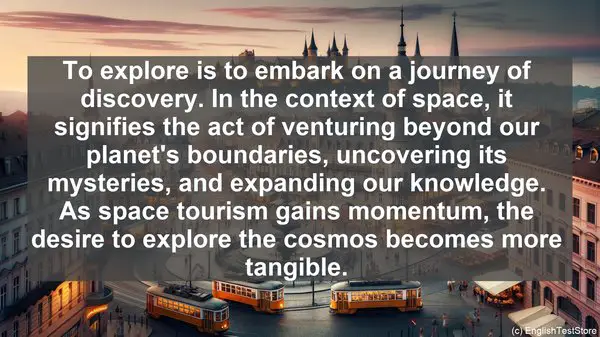Introduction: The Language of Space
Greetings, students! As we venture into the realm of space tourism and commercial spaceflight, it’s crucial to understand the language that accompanies this field. Today, we’ll focus on the top 10 English verbs that will enable you to actively participate in conversations on this topic.
1. Explore: The Essence of Space Travel
To explore is to embark on a journey of discovery. In the context of space, it signifies the act of venturing beyond our planet’s boundaries, uncovering its mysteries, and expanding our knowledge. As space tourism gains momentum, the desire to explore the cosmos becomes more tangible.
2. Orbit: The Dance of Celestial Bodies
Orbiting is a fundamental concept in spaceflight. It refers to the path an object takes around a celestial body, such as a planet or a star. Satellites, for instance, are designed to orbit Earth, providing us with invaluable data and enabling various communication technologies.
3. Dock: Connecting in Space
Docking is the process of joining two spacecraft together while in space. It’s a critical maneuver, as it allows for crew transfers, resupply missions, and the creation of larger structures, such as space stations. The ability to dock with precision is vital for the success of any space mission.
4. Descend: Returning to Earth
While space travel often involves ascending to great heights, the eventual return to Earth is equally significant. Descending refers to the act of coming back, reentering our planet’s atmosphere, and safely landing. It’s a complex operation that requires careful planning and execution.
5. Pioneer: Forging a New Path
To pioneer is to be at the forefront, leading the way. In the context of space, it denotes the individuals or organizations that push the boundaries, developing new technologies, and setting the stage for future explorations. Pioneers in space have always been catalysts for progress.

6. Collaborate: The Power of Unity
Space endeavors often require collaboration on a global scale. Whether it’s international space agencies working together or private companies partnering with research institutions, the ability to collaborate effectively ensures the pooling of resources and expertise, leading to remarkable achievements.
7. Innovate: Constant Evolution
Innovation is the lifeblood of space exploration. From advanced propulsion systems to cutting-edge materials, the field is constantly evolving. The verb ‘innovate’ encapsulates the spirit of continuous improvement, as scientists and engineers strive to overcome challenges and reach new frontiers.
8. Simulate: Preparing for the Unknown
Before any mission, extensive simulations are conducted. These simulations recreate the conditions of space, allowing astronauts and ground teams to train, troubleshoot, and refine procedures. Simulating various scenarios is essential for preparedness and ensuring mission success.
9. Adapts: Navigating the Unpredictable
Space is a dynamic environment, and situations can change rapidly. The ability to adapt, to adjust plans and strategies in real-time, is crucial. Whether it’s responding to an anomaly or recalibrating mission objectives, adaptability is a trait that every space explorer must possess.
10. Inspire: The Impact of Space Exploration
Lastly, space exploration has always been a source of inspiration. It has the power to captivate, to ignite curiosity, and to drive innovation in other fields. The verb ‘inspire’ encompasses the profound influence that space has on our collective imagination and the future it holds.

